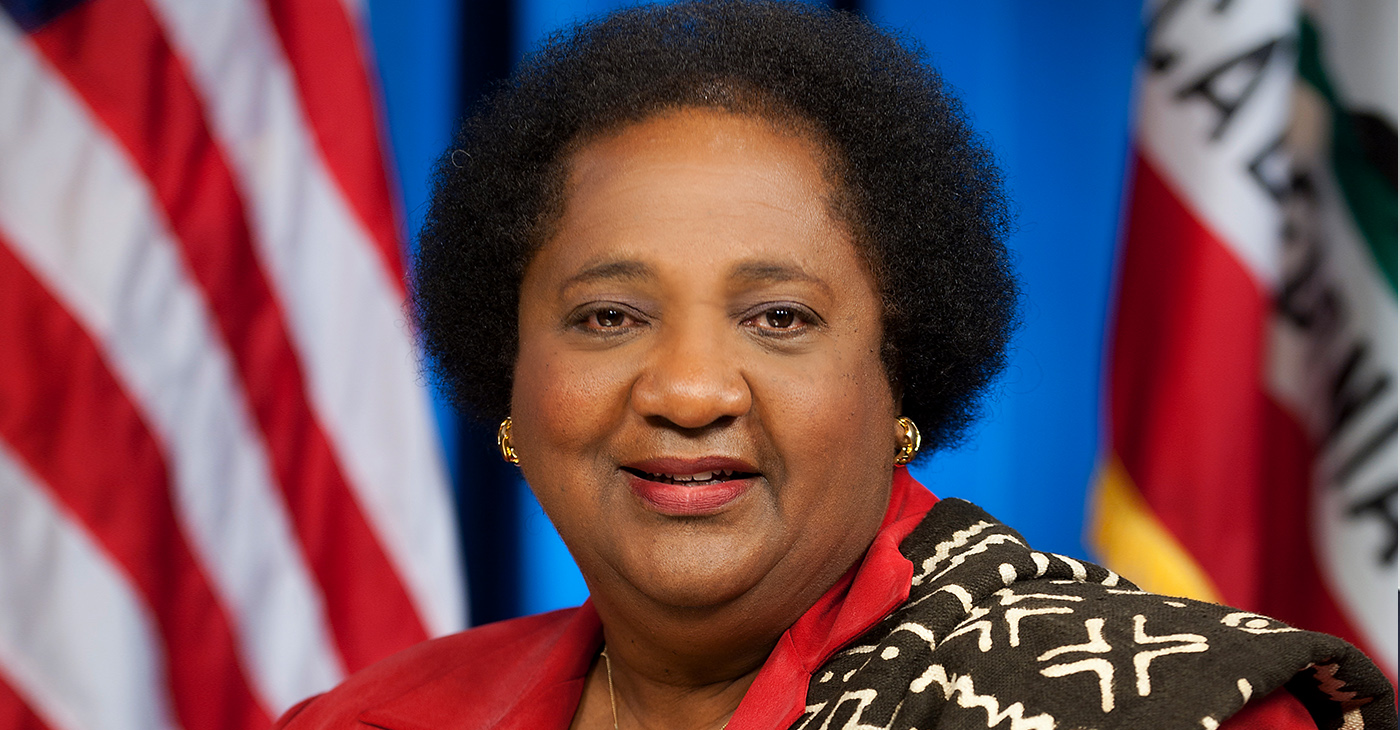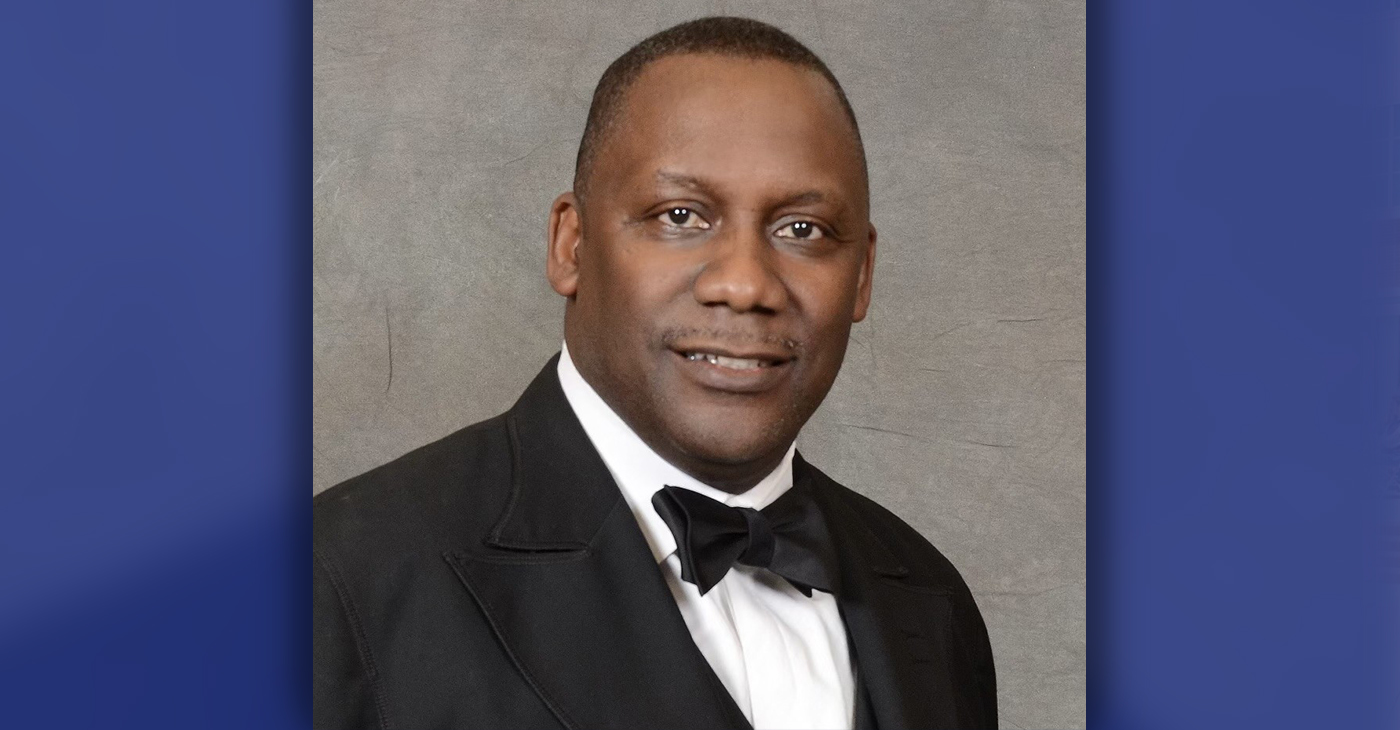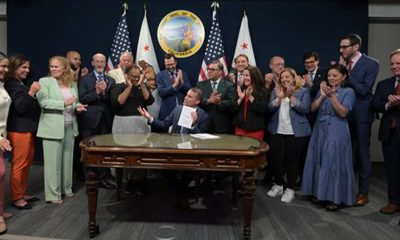Bay Area
Madame Secretary: Hon. Shirley N. Weber Reflects on Voting Rights, First Year in Office
Shirley Weber, California’s 31st Secretary of State (SOS),introduced AB 3121, a bill that set up a committee called the Task Force to Study and Develop Reparations Proposals for African Americans. The group is charged with examining California’s involvement in slavery – and how California should compensate the descendants of enslaved Black Americans.

By Tanu Henry | California Black Media
In December 2020, Gov. Gavin Newsom appointed Shirley Weber California’s 31st Secretary of State (SOS), the state’s chief election official.
The first African American to serve in the role – and the fifth Black person to become a constitutional officer in California – Weber took office on Jan. 29, 2021.
Weber has been a central and influential figure in California politics for years. She was an Assemblymember representing the 79th District in San Diego County and chaired the California Legislative Black Caucus (CLBC).
In the Legislature, she introduced groundbreaking bills, including one of the strictest laws governing police use of deadly force in the country. It will protect Californians on “both sides of the badge,” she said, celebrating that legislation, which was supported by the California Police Chiefs Association.
Weber introduced AB 3121, a bill that set up a committee called the Task Force to Study and Develop Reparations Proposals for African Americans. The group is charged with examining California’s involvement in slavery – and how California should compensate the descendants of enslaved Black Americans.
As SOS, Weber is responsible for conducting elections in all 58 counties, managing the operations of the State Archives, and keeping a registry of businesses and nonprofits statewide.
“We passed legislation that gives everybody a vote-by-mail ballot, and we’ve seen that it works” says Weber, sharing details about a major electoral policy change she has implemented as SOS. “We have to make sure that every eligible Californian not only gets the right to vote, but that they are registered to vote and that they show up.”
On January 24, California Black Media interviewed Weber at her Sacramento office.
CBM: As an Assemblymember, you introduced groundbreaking legislation. What has the transition been like, moving from actively creating policy to settling into the administrative role of Secretary of State?
SOS: It’s been interesting, to go from being a legislator where you share the responsibility of representing all Californians with 80 others in the Assembly and another 40 in the Senate.
There, I wasn’t responsible for all registered voters and the protection of those who work at the polls and those who work to register voters.
Over here, you have an administrative role, and we support legislation like the Voting Rights Act.
It’s been somewhat difficult to let go of my District. Fortunately, my daughter is the Assemblymember there now.
CBM: The U.S. Senate did not pass the John Lewis Voting Rights Advancement Act. Why is that significant and why are voting rights so important in America right now?
SOS: When Gov. Newsom asked me to be Secretary of State, the first thing that popped in my mind was voting rights. This wasn’t a position that I had lobbied for. We had made some tremendous changes in the Assembly and passed some groundbreaking legislation.
Speaking to a reporter last December 22nd, I said, ‘This is a critical time because our nation is in peril.’ And he goes, ‘what do you mean?’ I said, ‘Our democracy is in crisis.’ He didn’t understand. When January 6 hit (the insurrection at the U.S. Capitol), people understood.
I recognize this is a difficult and unique time for people in the nation, extremely difficult for African Americans, because most of us who have parents or we ourselves have lived through this struggle for voting rights.
My family understood the power of voting. My parents came out of Arkansas where they never got a chance to vote. My dad was an adult with six kids before he actually got a chance to register to vote in California.
CBM: What can ordinary Californians who care about expanding and protecting voting rights do?
SOS: We need to pay attention. We must fight laws that make it difficult for people to vote. Even though we don’t have that legislation coming out of our Legislature, we have people putting initiatives on the ballot.
California has expanded voting rights so much that people want to limit it. There’s only one group that can’t vote in this state: those who are physically in prison. Everyone else who meets the eligibility requirements in California can vote. And that frightens some people.
CBM: Do you see that movement to counteract the expansion of voting rights here in California or from other states?
SOS: It is coming from within and without. We have to be careful of the deceptive methods used. Take the campaign against bail reform. It had been signed into law. And a group of bail bondsmen took a whole bunch of money, manipulated African Americans and put their faces on television. It confused voters and wiped out this whole effort we had been working on for five or six years.
CBM: Do you think other Secretaries of State across the country will emulate California’s efforts to expand voting rights?
SOS: We are seeing that, especially in states with Democratic leadership. But in other places, we see also them fighting the Voting Rights Act.
Secretaries of State are a unique breed. Many are appointed by governors. Across the nation, people on the Far Right are organizing to get candidates to run for Secretary of State, where before it was seen more as an administrative job with a few other responsibilities. Now, it is seen as a highly political job, especially given the legislation that’s coming out in some places that would empower Legislatures to overturn votes.
CBM: You’ve been in this job for a year. Do you feel like you’ve accomplished your goals?
SOS: I didn’t take this position because I needed to be a constitutional officer, or one day become governor. The question for me was: ‘What does the Secretary of State have to offer in these critical times?’ And obviously it is the defense of our democracy. I was coming in with the idea that we are going to expand our voting base. We have done that.
We’ve also expanded the California Voter Choice Act counties. Half of our counties are Voter Choice Act counties, which gives us additional resources to go into those counties. They are now outvoting the rest of the counties.
Statewide, 88% of eligible Californians are registered right now to vote. My goal is to get it to 100 %.
Is California implementing additional safeguards to make sure irregularities are minimal?
Yes, we are. We have a system that verifies votes. We test every machine in California before every election. We make it possible for people to observe the process. They can’t come and start counting themselves. But they can observe. We do all this with transparency.
CBM: How does it feel to look at that long wall of portraits of past Secretaries of State, and know that your legacy will be enshrined in California history?
SOS: I’m very grateful. When I was sworn in, somebody says you’re the first African American after some 170 years. How does that feel? I said, well – what took so long?
Activism
Oakland Post: Week of July 24 – 30, 2024
The printed Weekly Edition of the Oakland Post: Week of July 24 – 30, 2024

To enlarge your view of this issue, use the slider, magnifying glass icon or full page icon in the lower right corner of the browser window. ![]()
Activism
Oakland Post: Week of July 17 -23, 2024
The printed Weekly Edition of the Oakland Post: Week of July 17 -23, 2024

To enlarge your view of this issue, use the slider, magnifying glass icon or full page icon in the lower right corner of the browser window. ![]()
Bay Area
Op-Ed Senate Bill 966 Threatens Health Equity in East Bay
My East Bay community is struggling to get by. A proposed State Senate bill would set us back even further. Serving the East Bay community has been my life’s work and my greatest joy. After leaving the Bay Area to complete my seminary, I returned home to found The Community Church in Oakland. From the outset of my time as the church’s pastor, I have been guided by the belief that my service must extend beyond the pulpit, because the health and economic needs of my community are so great. Our church has organized free food banks, COVID-19 testing clinics, and a housing and re-entry program for those suffering from addiction.

By Rev. Dr. Lawrence E. VanHook
Special to the Post
My East Bay community is struggling to get by. A proposed State Senate bill would set us back even further.
Serving the East Bay community has been my life’s work and my greatest joy. After leaving the Bay Area to complete my seminary, I returned home to found The Community Church in Oakland.
From the outset of my time as the church’s pastor, I have been guided by the belief that my service must extend beyond the pulpit, because the health and economic needs of my community are so great. Our church has organized free food banks, COVID-19 testing clinics, and a housing and re-entry program for those suffering from addiction.
Through my service, I have seen the challenges that our community members are facing. Oakland, my hometown, has the third-highest rate of violent crime in the state. The local economy is strained. Oakland-based businesses are leaving our community because they’re struggling to get ahead.
Both East and West Oakland has disproportionately high rates of respiratory illness due to heavy air pollution. While our local efforts have brought some aid to those in need, we are also counting on our state elected officials to help us address the systemic health disparities afflicting the community.
Chief among the health concerns of community members is having reliable and affordable access to prescription drugs. Equitable access to medications gives us the peace of mind that we can keep ourselves and our families healthy and safe. Our community should not have to choose between paying rent or purchasing prescriptions.
Unfortunately, rather than taking action to combat soaring prescription drug prices, some California lawmakers are pushing legislation that could raise patient costs at the pharmacy counter.
The Legislature is currently considering SB 966, a bill backed by special interests that would undercut the few tools we have to keep prescription drug costs contained, letting big drug companies increase their prices, profiting on the backs of working families – some of whom already live paycheck to paycheck.
SB 966 would target the fundamental programs through which small businesses, unions, and government health programs are able to offer their employees and members quality and affordable healthcare. Millions of Californians rely on these plans to obtain essential medications at the lowest-possible cost.
The bill would make it illegal for employers and unions to incentivize the administrators of their prescription drug plans to negotiate for the lowest possible cost for prescriptions. Right now, small businesses and unions can choose to pay these administrators more for taking on big drug companies and securing discounts – a choice that will be outlawed under this bill.
As a result, employers will have no leverage to stop big drug companies from setting sky-high prices, disproportionately impacting working families.
As these health costs quickly add up, employers will have little choice but to pass the increases down to their employees. That means California patients will see higher healthcare costs and co-pays.
From my perspective, most concerning is that the bill would exacerbate the health disparities impacting my community and other underserved populations. If SB 966 becomes law, the most vulnerable may be forced to skip prescription doses, stop filling their prescriptions, and avoid essential care.
By rejecting this cash grab by big drug companies, our state elected officials can send a clear message that they stand with the community, patients, and working families.
We cannot afford SB 966.
Rev. Dr. VanHook is the founder and pastor of The Community Church in Oakland and the founder of The Charis House, a re-entry facility for men recovering from alcohol and drug abuse.
-

 Arts and Culture3 weeks ago
Arts and Culture3 weeks agoRooted in Tradition: The Intricate History of Black Hair Braiding
-

 Bay Area4 weeks ago
Bay Area4 weeks ago“I Will Not Be Bullied,” Says Oakland Mayor Sheng Thao
-

 Bay Area2 weeks ago
Bay Area2 weeks agoPG&E Increases Rates While Bay Area Households Are Struggling to Stay Afloat
-

 Business3 weeks ago
Business3 weeks agoGov Newsom: Raising Fast Food Minimum Wage to $20 Pays Off as Jobs Multiply in Industry
-

 Activism4 weeks ago
Activism4 weeks agoOpponents of Mayor Sheng Thao Are Calling on Her to Resign Following FBI Raid
-

 Bay Area2 weeks ago
Bay Area2 weeks agoJuneteenth Mass Shooting Suspect Charge with Multiple Counts of Felony Assault by Alameda County DA Pamela Price
-

 Community1 week ago
Community1 week agoHundreds Come to Jehovah’s Witnesses’ Assembly Hall for Three-Day Program of ‘Good News’ in Fremont
-

 Activism4 weeks ago
Activism4 weeks agoOakland Coliseum Sale to AASEG: A Model for Community Development and Inclusion





















































